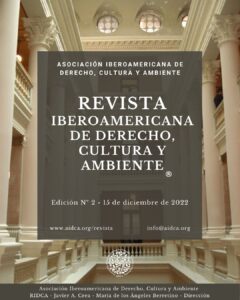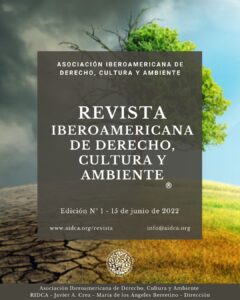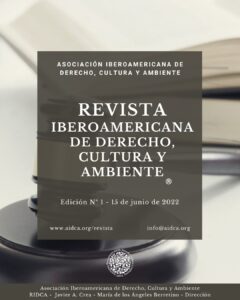ISSN 2953-3554
Policy and editorial responsibility
The Ibero-American Journal of Law, Culture and Environment has its antecedents in the publications that have been generated since 2020 as a result of the papers presented (Memory of events) in the different congresses and investigative academic activities organized by the Ibero-American Association of Law, Culture and Environment.
It is aimed primarily at professionals, teachers, researchers and students, mainly from Latin America, whether or not they are members of AIDCA, who are interested in publishing the results of their research through it.
Its policy adheres to the system of continuous publications, with numbered biannual publications. It also adheres to the Open Access initiative, in order to promote the immediate socialization of the results that are exposed as part of its content.
Responsibility of the authors
- Research principles: The authors are responsible for presenting the original research, whatever their area of knowledge, with a truthful description of the methodology and methods used, and an objective discussion of the importance of the results of the same. The written report must properly use the grammar of the language in which the manuscript is written, as well as respect the basic principles of scientific writing, without failing to include the necessary details and references so that others can repeat the research. Deliberately false or incorrect statements that threaten the integrity and ethics of the journal will not be admissible.
- Redundant, numerous or simultaneous publication: Those authors whose manuscripts are similar to other own materials that are subject to evaluation in more than one journal or primary publication, and that expose identical results to those presented to the RIAS, will be vetoed. Said behavior is not compatible with the integrity and ethics of the journal, for which the authors assume the commitment to guarantee that the submitted manuscript is an original work and that it does not infringe the rights of third parties.
- Authenticity and plagiarism: As has been reaffirmed across the board, the articles submitted to the RIAS must be completely original, which means that all works that have served as background or theoretical framework for them have been duly referenced in the text. Plagiarism will not be tolerated under any circumstances.
- The authorship of the article: The authorship belongs to the individuals who actively participated in the design, implementation, evaluation or understanding of the article; Hence, all those who contributed to its realization in one way or another must be recognized by the author as co-authors. Other people who contributed to the research may be listed as contributors. The main author is responsible for guaranteeing that all the co-authors have reviewed the final version of the document and, consequently, have given their approval for its submission to the journal. When the authorship of an article is shared, it must be formally declared that:
- Acknowledgment of sources: As explained, authors must include the background information that influenced the content of their work. Private investigation, such as communication or dialogue with third parties, is prohibited, except in those cases in which there is written evidence of the permission of those individuals for such purposes; as well as when it comes to information collected through confidential methods such as manuscript reviews or grant applications.
- Transparency and interests: All authors must disclose in the article any financial or other conflicts of interest that could interfere with the results and interpretations of their research. All funding for the project must be disclosed.
- Fundamental Errors in Published Research: When an author becomes aware of a fundamental error or inaccuracy in his or her own published research, he or she is required to notify the editor or editor of the journal immediately, by virtue of retrieving or correcting his or her article.
Publishers Responsibility
- Publication selection: Responsible for the selection of the manuscripts that will be published in the journal, always complying with the ethical standards and legal guidelines previously established by it, especially those related to the prevention of defamation, copyright infringement and plagiarism. Has the authority to discuss decisions related to the selection of articles with the Editorial Team.
- Non-discrimination clause: The editor will review manuscripts and make decisions about them, regardless of skin color, gender, sexual orientation, religious beliefs, ethnic origin, nationality or political ideology of the authors.
- Confidentiality agreement: Both the editor and any member of the writing team are prohibited from disclosing information about the submitted manuscript to persons other than the corresponding author, such as reviewers, potential reviewers, other editorial advisors or editorial.
- Transparency and interests: Both the editor and any member of the editing team are prohibited from using the manuscripts in their own research, unless they have obtained the express written consent of the author. Likewise, they must refrain from those texts that represent a conflict of interest as a result of any possible connection, whether competitive or mutual, with their authors, institutions, companies, etc.
Responsibility of reviewers
- Confidentiality: All manuscripts sent for review are considered confidential documents, for this reason they will not be discussed or presented to anyone outside the editorial process, according to the chain of command.
- Punctuality: As time and knowledge are key factors for the timely publication of the articles submitted for evaluation, reviewers who at the time of delivery of the manuscripts cannot carry out their review with the quality, transparency and speed, they must reject such responsibility before the publisher, explaining the reasons why they cannot be involved in that process.
- Requirements for objectivity: Criticism of the texts submitted for review must be carried out in a neutral manner, focusing opinions on the basis of reasonable arguments.
- Entry into the editorial evaluation: The evaluations must be carried out with the established scientific rigor and must provide the information required by the editor for decision making. By virtue of raising the quality of the manuscripts and streamlining the editorial process of those cases that require it.
- Acknowledgment of sources: This function forces the reviewers to take into account, due to their cultural background and mastery of the topics addressed in the manuscript, the recognition of that material present in the text and not cited by the author; and whether there is any considerable resemblance between the referenced articles and the manuscript under consideration.
- Transparency and interests: Private information and ideas collected through peer review must remain classified and not be used for the benefit of the reviewer, who must refrain from manuscripts that represent a conflict of interest as a result of any possible connection, either competitive or mutual, with its authors, institutions, companies, etc.
Privacy Policy
The contents published in the Ibero-American Journal of Law, Culture and Environment are registered and protected by the laws for the protection of intellectual property. When submitting the manuscript, and only if it is accepted for publication, the copyright of the published articles belongs to the authors.
The names and email addresses entered in this magazine will be used exclusively for the purposes stated in it and will not be provided to third parties or used for other purposes.
Open access policy
This journal provides open access to its content, in accordance with the principles that govern the socialization of knowledge.
Ethics Statement
The Ibero-American Journal of Law, Culture and Environment subscribes to the Code of Conduct for Editors, of the Publication Ethics Committee (COPE), meaning that all the articles it publishes are governed by the standards of ethics and quality established internationally for each of the stages of the editorial process and the actors involved in them, the latter: authors, editors, reviewers, proofreaders, translators and general management. That is why any of the manifestations of plagiarism, favoritism or other unethical behavior that may be detected during editorial management and that may undermine the seriousness and credibility of the journal are inadmissible.
Anti-plagiarism policy
The editorial board of the Ibero-American Journal of Law, Culture and Environment uses specialized software to detect coincidences and similarities between the texts submitted for evaluation and those previously published in other sources.
Unethical behavior management method
- Whenever negative behaviors and unethical actions are identified, both by the authors and by any member of the Editorial Team, they will be reported to the editor for further analysis and action in this regard.
- Misconduct and unethical actions for authors include, in addition to the examples described above, plagiarism or falsification of research.
- The person who identifies an unethical praxis or conduct must offer sufficient evidence to justify the initiation of a legal investigation. All complaints must be seriously considered and treated similarly, until a corresponding result or agreement is reached.




